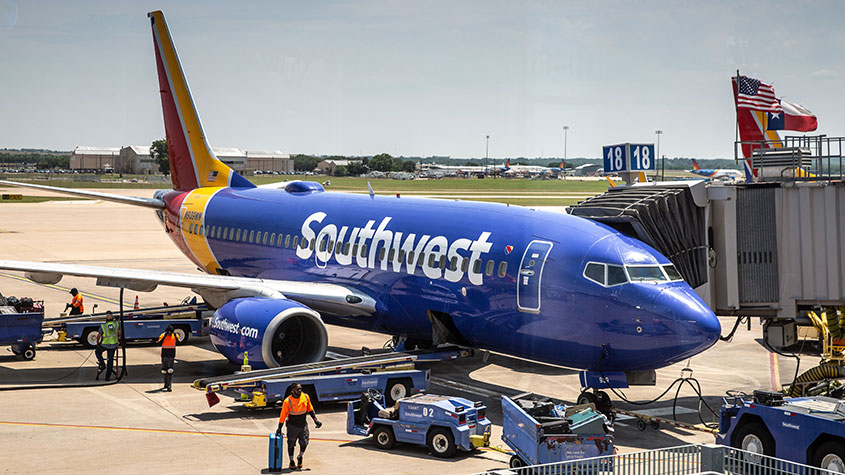Three airline stocks for the post-pandemic travel boom
Professional investor Frank Holmes of the US Global Jets UCITS ETF picks three airline stocks that are ready for take-off.


Get the latest financial news, insights and expert analysis from our award-winning MoneyWeek team, to help you understand what really matters when it comes to your finances.
You are now subscribed
Your newsletter sign-up was successful
Want to add more newsletters?

Twice daily
MoneyWeek
Get the latest financial news, insights and expert analysis from our award-winning MoneyWeek team, to help you understand what really matters when it comes to your finances.

Four times a week
Look After My Bills
Sign up to our free money-saving newsletter, filled with the latest news and expert advice to help you find the best tips and deals for managing your bills. Start saving today!
The Jets Airline ETF tracks firms within the commercial airline, aircraft manufacturing, and airport- and terminal-services industries. This is the first unconstrained summer travel season in three years, so airlines and airports are bracing for what is expected to be a particularly busy three months. Airlines, in fact, have recently upgraded their second-quarter revenue projections, citing higher than expected demand. Here are three airline stocks I’m keeping my eye on as we head into the busy summer season.
Southwest Airlines: an American low-cost leader
Southwest Airlines (NYSE: LUV) has the number-one position in 23 of the top 50 markets in the US, and the focus at present is on restoring the network to pre-pandemic levels. It’s also concentrating on maintaining its low-cost advantage, a task that includes coming up with more efficient flight plans, optimising maintenance planning and modernising its revenue-management system.
In December 2021 the company signed a nine-year credit-card co-brand agreement with Chase, which has already proved very lucrative. These initiatives are expected to add between $1bn and $1.5bn to earnings before interest and taxes (EBIT) by 2023. Approximately 64% of Southwest’s fuel costs is hedged for the rest of this year at around $60 a barrel. This puts the company in a better position than many of its larger peers.
MoneyWeek
Subscribe to MoneyWeek today and get your first six magazine issues absolutely FREE

Sign up to Money Morning
Don't miss the latest investment and personal finances news, market analysis, plus money-saving tips with our free twice-daily newsletter
Don't miss the latest investment and personal finances news, market analysis, plus money-saving tips with our free twice-daily newsletter
Alaska Airlines: first to get back on its feet
Alaska Airlines (NYSE: ALK) appears to have the best balance sheet in the industry, with a 49% debt-to-capitalisation ratio. Since the start of the pandemic, it’s been the first airline to stop burning through cash, the first to become cash-flow positive and the first to become profitable.
The company is moving toward a low-cost structure that should match Southwest’s by next year. The group’s operating margin has regularly eclipsed the domestic industry’s over the past 20 years. Unlike other airlines, Alaska is working towards a single-type fleet, which should lead to millions in cost savings in aircraft swaps, maintenance and less need to train pilots. This is expected to more than offset higher labour and airport costs. Half of Alaska’s fuel requirements are hedged until the end of this year at a cost of $71 a barrel.
Ryanair: Europe’s biggest budget carrier
Ryanair Holdings (Nasdaq: RYAAY) is the largest airline in Europe, with flights to nearly 40 countries. The budget carrier is well positioned to take advantage of an increase in demand for leisure travel as Europe drops its Covid-19-related measures and restrictions.
To give you an idea of just how busy Europe may be this summer, the European airspace manager EUROCONTROL recently said it expects traffic in the upcoming months to stand at 90% of pre-pandemic levels. This could be a huge boon for Ryanair, which reported an average of 2,815 flights per day in April.
Ryanair is also drawing in the growing number of climate-conscious consumers in the European market. In June 2021 the company took delivery of the Boeing 737-8200 Gamechanger aircraft, which reduces fuel consumption by 16% per seat. As of March 2022, Ryanair has taken delivery of 61 of these aircraft. It will reportedly acquire an additional 70 within the year.
Get the latest financial news, insights and expert analysis from our award-winning MoneyWeek team, to help you understand what really matters when it comes to your finances.
Frank Holmes is co-creator of the US Global Jets UCITS ETF
-
 Should you buy an active ETF?
Should you buy an active ETF?ETFs are often mischaracterised as passive products, but they can be a convenient way to add active management to your portfolio
-
 Power up your pension before 5 April – easy ways to save before the tax year end
Power up your pension before 5 April – easy ways to save before the tax year endWith the end of the tax year looming, pension savers currently have a window to review and maximise what’s going into their retirement funds – we look at how
-
 Halifax: House price slump continues as prices slide for the sixth consecutive month
Halifax: House price slump continues as prices slide for the sixth consecutive monthUK house prices fell again in September as buyers returned, but the slowdown was not as fast as anticipated, latest Halifax data shows. Where are house prices falling the most?
-
 Rents hit a record high - but is the opportunity for buy-to-let investors still strong?
Rents hit a record high - but is the opportunity for buy-to-let investors still strong?UK rent prices have hit a record high with the average hitting over £1,200 a month says Rightmove. Are there still opportunities in buy-to-let?
-
 Pension savers turn to gold investments
Pension savers turn to gold investmentsInvestors are racing to buy gold to protect their pensions from a stock market correction and high inflation, experts say
-
 Where to find the best returns from student accommodation
Where to find the best returns from student accommodationStudent accommodation can be a lucrative investment if you know where to look.
-
 The world’s best bargain stocks
The world’s best bargain stocksSearching for bargain stocks with Alec Cutler of the Orbis Global Balanced Fund, who tells Andrew Van Sickle which sectors are being overlooked.
-
 Revealed: the cheapest cities to own a home in Britain
Revealed: the cheapest cities to own a home in BritainNew research reveals the cheapest cities to own a home, taking account of mortgage payments, utility bills and council tax
-
 UK recession: How to protect your portfolio
UK recession: How to protect your portfolioAs the UK recession is confirmed, we look at ways to protect your wealth.
-
 Buy-to-let returns fall 59% amid higher mortgage rates
Buy-to-let returns fall 59% amid higher mortgage ratesBuy-to-let returns are slumping as the cost of borrowing spirals.
